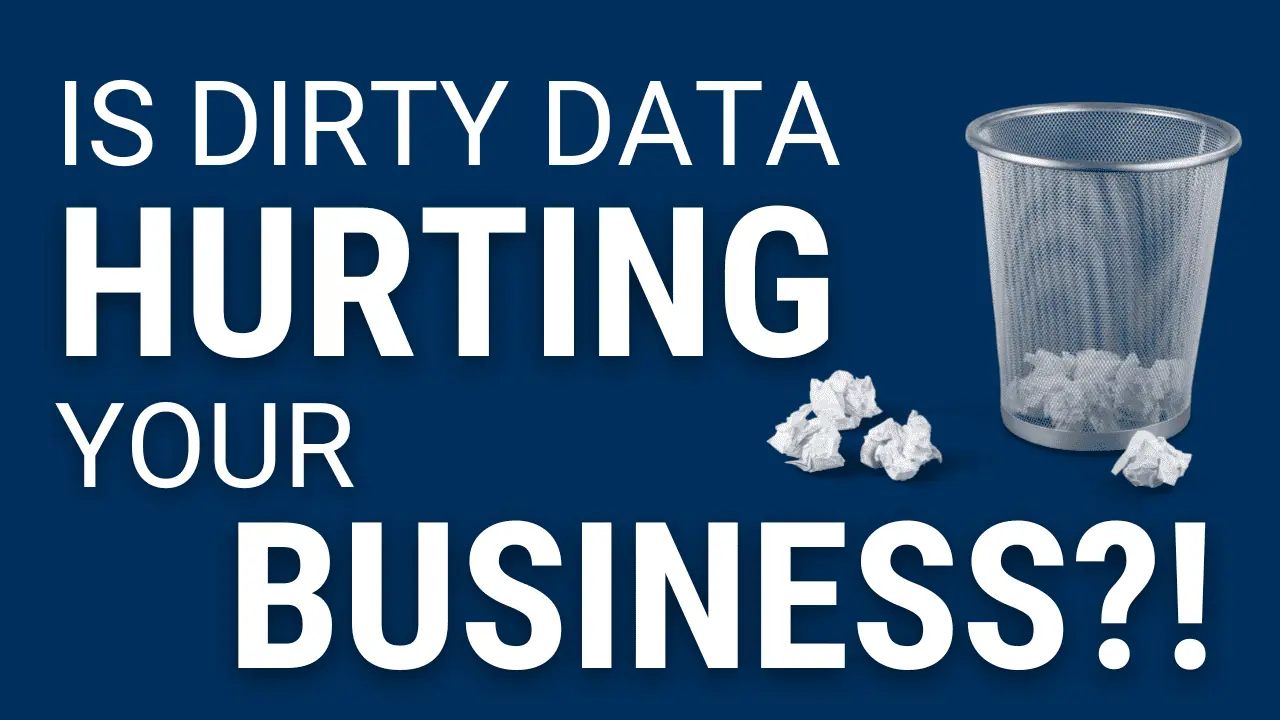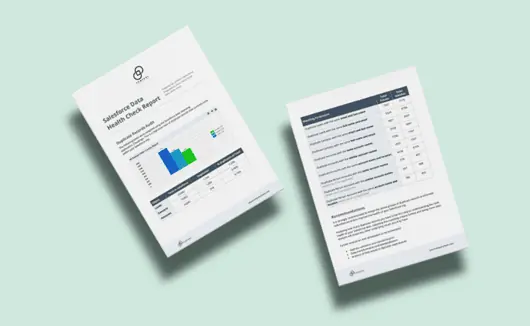December 14, 2022
Bad Data in Salesforce: How Does It Impact Your Business?
How bad data can impact your business and what you can do to prevent it

Salesforce is a powerful tool that can help businesses grow, but only if its data is accurate. Unfortunately, bad data can cause many business problems, from decreased efficiency and accuracy to missed opportunities and lost revenue.
In this blog post, we’ll discuss how bad data can impact your business and what you can do to prevent it.
This information will help you keep your Salesforce data clean and accurate so you can focus on growing your business!

Impacts Decision-Making
Imagine you’re a sales leader trying to close a big deal. You review your reports in Salesforce to check your team’s progress and see that the numbers are all over the place. Some deals are marked as closed when they’re still open, others are assigned to the wrong rep, and some data is just plain wrong. You can’t make heads or tails of it, so you have to spend an hour on the phone with your team sorting it all out. Meanwhile, the clock is ticking on your deadline.
Imagine you’re a marketing leader tasked with increasing leads by 10%. You pull up your reports and see that nearly half of your leads are duplicates, and another 20% are inaccurate. Even if you achieve your goal, you’ll still be behind. And finally, imagine you’re a customer support rep trying to help a frustrated customer. But when you pull up their account information, it’s outdated, incomplete, and full of errors. Frustrated, the customer hangs up and takes their business elsewhere.
These are just a few examples of how poor data quality can impact businesses that ignore their data quality issues in Salesforce. Sales leaders lose valuable time chasing down insufficient data, marketing leaders miss out on opportunities to engage leads, and customer support reps struggle to provide accurate and helpful assistance.
In today’s data-driven economy, businesses can’t afford to neglect their data quality issues. By taking steps to ensure their Salesforce data is clean, accurate, and up-to-date, businesses can set themselves up for success.

Hinders Business Operations
As anyone who has worked with Salesforce knows, data quality is essential for business operations. Duplicate data, inaccurate data, non-compliant data, outdated data, and more can negatively impact business operations.
This poor data quality impacts managers and business leaders across all organization departments in Salesforce. From sales and marketing to customer service and support, everyone needs access to accurate and up-to-date data to do their job effectively.
When data quality issues are present, it can lead to inefficiencies, errors, and frustration for employees. In some cases, it can even result in lost business opportunities.
Ignoring data quality issues in Salesforce is not an option for businesses that want to operate effectively.
Salesforce comes with a few different ways to identify duplicate records, depending on whether you use Classic or Lightning. But no matter which method you use, the biggest downside is that it’s all a manual process.

Results in Increased Costs
1. Poor data quality can lead to lost sales opportunities
Any sales professional knows that data is key to success. Good data can help to identify trends, understand customer needs, and find new opportunities. However, poor data quality can have the opposite effect. Salespeople may waste time chasing bad leads or miss out on deals because they lack critical information.
In some cases, poor data quality can even lead to lost sales. For example, if a customer’s contact information is entered incorrectly, the salesperson may never be able to reach them. In other cases, incorrect data may lead to frustration and confusion, eventually causing the customer to give up and go elsewhere.
While the costs of poor data quality can be challenging to quantify, there is no doubt that it can have a tangible impact on a company’s bottom line. As such, sales professionals must ensure that the data they are working with is of the highest quality.
2. Poor data quality can lead to decreased customer satisfaction
Whenever a customer interacts with a company, they expect a certain level of quality and professionalism. This is especially true when it comes to data.
Poor data quality can significantly impact customer satisfaction, leading to errors and inconsistencies. This, in turn, can discourage customers from continuing to work with the company. In some cases, it may even lead to legal action.
As a result, companies must ensure that their data is of the highest quality. Otherwise, they risk losing the trust and confidence of their customers.
3. Poor data quality can lead to increased marketing costs
No matter how skilled or experienced your marketing team may be, their efforts will always be limited by the quality of your data.
Inaccurate or incomplete data leads to poor decision-making, resulting in wastefulness and inefficiency. As a result, poor data quality can quickly be eating into your marketing budget.
In addition, it can make it difficult to track the ROI of your marketing efforts, as you won’t be able to identify which campaigns are driving results. While there is no silver bullet for solving this problem, making a concerted effort to improve the quality of your data is essential for effective marketing.
Cleaning and updating your data regularly can help ensure your marketing budget is used as effectively as possible.
4. Poor data quality can lead to decreased employee productivity
When data quality is poor, it can lead to decreased employee productivity. This can be frustrating for employees, who may be wasting time cleaning up data or tracking missing information.
In some cases, employees may even avoid using Salesforce altogether if they feel it’s too difficult to work with.
Poor data quality can also lead to incorrect reports or analyses, creating problems for the company. Ultimately, poor data quality can have a ripple effect that negatively impacts employee productivity and overall company success.
By prioritizing data quality, businesses can help ensure that their employees can work at their best.
5. Poor data quality can lead to compliance issues
Any executive will tell you their day is filled with meetings, phone calls, and emails. Despite all this, they are also trying to stay ahead of the competition and grow their business.
The last thing they need is to be derailed by compliance issues. However, that can happen if Salesforce data quality is poor.
Executives may find themselves being pulled into meetings to discuss compliance breaches or spending hours on the phone dealing with customers who are upset about incorrect data.
Sometimes, they may even be called to testify in front of Congressional committees. Poor data quality can hijack an executive’s attention and derail their growth plans. It is, therefore, essential to ensure that Salesforce data is of the highest quality possible.

Hampers Regulatory Compliance
Poor data quality can significantly impact a company’s ability to comply with local, state, and federal regulations. Inaccurate data can lead to missing or incorrect filings, resulting in heavy fines.
In addition, poor data quality can make it difficult for auditors to assess compliance risk. As a result, companies must invest time and resources into keeping their Salesforce data clean.
Although this may require an upfront investment, it is far less than the company would spend when faced with regulatory compliance violations. In addition, clean data can help to improve decision-making and increase operational efficiency.
As a result, investing in Salesforce data quality is essential for any company that wants to maintain a high level of compliance.

What are the Causes of Bad Data?
1. Data can be entered manually into Salesforce by users who may make mistakes while inputting the data.
2. Data can be imported into Salesforce from external sources, such as spreadsheets that are not carefully reviewed and cleaned before importing.
3. Data can be entered into Salesforce via integrations, APIs, or web-to-lead forms. If there are errors in the data submitted via these methods, those records will reside in Salesforce precisely as entered.
4. Salesforce automation could update records (in bulk) based on specific criteria and business rules that no longer apply.
5. Users can inadvertently delete data from Salesforce, which can cause problems with reporting and analytics.
6. Users can export data from Salesforce (via Reports) and then change it on a spreadsheet, reimporting the data with inaccurate, outdated, or invalid information.

How Can You Manage Bad Data Efficiently?
Cloudingo’s suite of tools makes it easy for Salesforce Admins to find and merge duplicate data. Cloudingo’s Dedupe and Clean features can quickly identify and automatically merge duplicate records in Salesforce. The tool includes a set of robust rules that Admins can use to find and merge duplicate records based on standard or custom fields.
Cloudingo’s Address Verification tool can be used to review and fix any address validation issues in Salesforce. The tool verifies the accuracy of addresses and fixes any errors. This helps to ensure that the company’s data is accurate and up-to-date.
Cloudingo’s Manage and Maintain features can be used to find Salesforce records that are erroneous, missing information, or non-compliant. This empowers Admins by letting them build custom queries to find specific records that are problematic. Once the records have been identified, the Cloudingo Bulk Update tool can be used to update them all at once. This helps to improve the quality of the data in Salesforce.
Looking to build a business case for Salesforce data quality?
Check out our blog, The ROI of Data Cleansing, to learn how a small investment in data cleansing tools can make a huge impact on your business.






